Living in Dublin: 23 Guidelines for Expats

* * *
Moving to another country, or even just considering moving to another country, can be exciting and terrifying all at the same time! Luckily, Ireland is one of the most welcoming countries you can choose as an expat, and living in Dublin may just be the best decision you will make.
Dublin is one of the most unique, exciting cities I have ever visited. I made some of my closest friends while living in Dublin, and I’m sure you will too!
If you are looking to move to Dublin from another country, these 23 guidelines will be the best advice to help you figure out life in Dublin:
TABLE OF CONTENTS
• About Dublin
• Is Dublin, Ireland a Good Place to Live?
• What Is the Weather Like in Dublin?
• Is It Safe to Live in Dublin?
• What Is the Cost of Living in Dublin, Ireland?
• What Salary Do You Need to Live in Dublin?
• What Are the Visa Requirements to Live in Dublin?
• Work Permits in Ireland
• Student Visas in Ireland
• Cost of Irish Visas
• Can You Work While Studying Abroad in Ireland?
• Living in Dublin as a Student
• Living in Dublin as a Family
• What Is Work Culture Like in Dublin?
• Where Are the Best Places to Live in Dublin?
• How to Find Accommodation in Dublin
• Are There a Lot of Other International People Living in Dublin?
• Is It Easy to Make Friends in Dublin?
• How Do You Get Around the City of Dublin?
• Language and Cultural Differences When Living in Dublin
• Food and Grocery Stores in Dublin
• Tips for Moving to Dublin
• Disadvantages of Living in Dublin (CONS)
• Advantages of Living in Dublin (PROS)
About Dublin
Ireland is known for its friendly people; practically everyone you meet is happy to tell you stories over a pint in the pub! Dublin–the capital of Ireland–might be a big, bustling city, but it is no exception to the friendly faces you will meet across the country.

Dubin has a unique culture and rich history. Many famous writers, such as James Joyce, have come from Dublin. Historic buildings, statues, and churches are scattered across the city.
Dublin is divided into North and South by the River Laffey. It has a population of approximately 1.2 million, and the Irish use the Euro as their form of currency.
English and Gaelic are the official languages of Ireland. While kids learn Gaelic in school, hardly anyone actually speaks it anymore.
Is Dublin, Ireland a Good Place to Live?
It always depends on what you are looking for, but I absolutely loved living in Dublin! The city has all the comforts you need and while it is on the pricey side, there are still enough affordable or free things to do.
I found that Dublin is very well-balanced with plenty of nightlife, activities, and a constant variety of new events or things to do. You can also easily take the train out of the city to the country or seaside for some nature. There are plenty of rock climbing, hiking, and even surfing groups if you are more outdoorsy!

Dublin feels like a big city mixed with a smaller one. It has everything you would expect from a big city in terms of easy access to material goods and plenty to keep you entertained. But there is still a sense of community, caring for your neighbors, and it is not so big you feel lost in the city like you might in London or New York.
What Is the Weather Like in Dublin?
The one thing I thought I knew about Dublin was that it rained a lot. As someone coming from Southern California, I was convinced that I would hate the weather in Dublin. Surprisingly, I actually found the weather to be much nicer than I first anticipated.
It drizzles often in Dublin, but it actually did not rain hard very frequently. The skies were often bright with beautiful clouds!
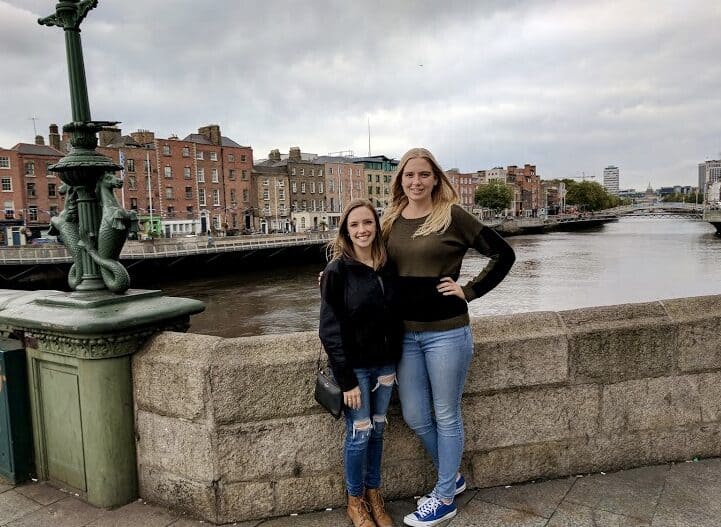
In the winter in Ireland (Jan/Feb) the lowest temperatures can get to about 36°F/2°C. The highest temperatures in the summer (July) are around 68°F/20°C. The average temperature in Ireland is in the 50s°F/9.9°C.
The real shock to me about living in Dublin was that the sun will start to set around 4pm in the winter. It was crazy to me that you could stay out too late the night before and sleep in, only to find that you pretty much miss the sun altogether the next day! At least in the summer, the sun sets around 9:30pm, which is quite lovely.
Is It Safe to Live in Dublin?
As a young white woman, I found it felt safe to live in Dublin, but it all depends on your situation and comfort level. It is a big city, so you will always have some sketchier areas that you probably want to avoid. As a whole, the people are very friendly and if you stay in groups it is almost always safe to wander around the city, even at night.
I typically stayed on the south side of River Laffey; walking from my apartment to and around the city center always felt safe to me. The further away from the city center and north, not so much. With the exception of Phoenix Park and some nicer neighborhoods.
What Is the Cost of Living in Dublin, Ireland?
Relatively speaking, it is pretty expensive to live in Dublin. The average rent in Dublin is approximately €2,156/month (or about €539/week). A single person’s estimated monthly costs are €900 without rent.
Of course, this all depends on the type of lifestyle you want, how nice of accommodation you want, and how often you spend money out. If you share an apartment and are frugal with your spending, this cost could go down.
For the Cost of Living in Ireland vs U.S. Comparison and Explanation, CLICK HERE
What Salary Do You Need to Live in Dublin?
The average person working in Dublin typically earns around €45,200 per year. Salaries can range from €11,400 (lowest average) to €202,000 (highest average). To be comfortable living in Dublin it is recommended to aim for a salary range of €50-€60,000.

What Are the Visa Requirements to Live in Dublin?
Depending on where you are from, you may or may not need a visa to enter the country. Visa requirements also depend on if you plan to work or study while living in Ireland, and how long you intend to stay in Ireland.
Generally speaking, it is MUCH easier to stay in Ireland for 3 months or less. If you plan to stay longer than 3 months, you will need permission to stay in the country. Less than 90 days will require a “C Visa” and over 90 days will require a “D Visa”.
To apply for an Irish visa, or to check if you will need an Irish visa, click here.
Work Permits in Ireland
A visa allows you entry to a country, a work permit allows you to work in a country.
You must hold a valid work Employment Permit if you are a non-EEA National in order to work in Ireland. There are different types of employment permits based on what type of employment you will be pursuing. You must receive a job offer before applying for an employment permit.
For more information on finding and securing a job in Ireland as an American, CLICK HERE.
Student Visas in Ireland
Student visas are fairly straightforward. If you are studying for less than 3 months you can apply for a “C Study Visa”. If it is more than 6 months, a “D Study Visa”.
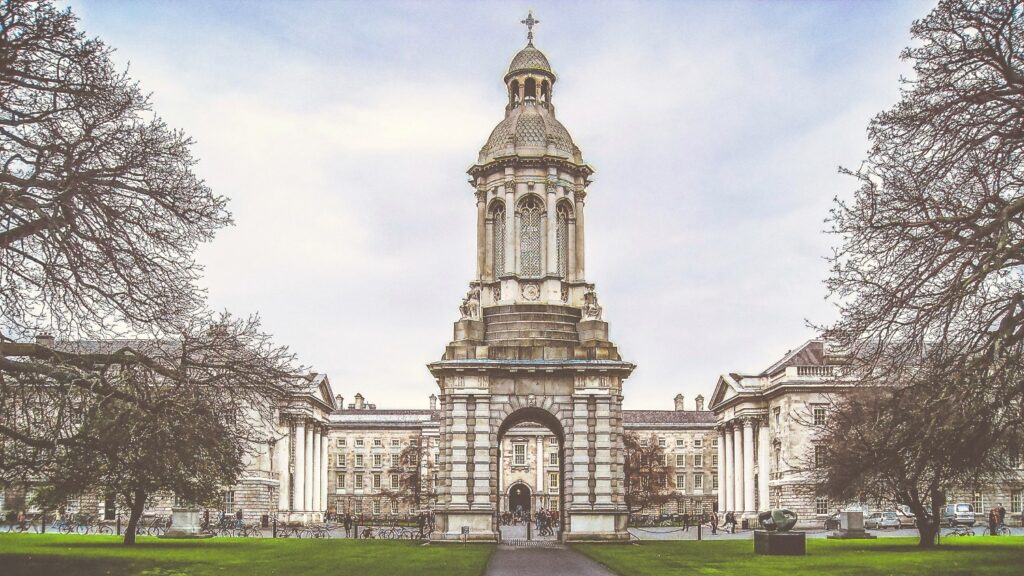
To apply for a student visa in Ireland, the main things you will need are proof of your university acceptance and courses, proof of sufficient funds, and proof you will leave the country after your studies are complete.
If you do not need a visa to enter the country, you do not require a student visa to study in Ireland. You will, however, need to get an Irish Residence Permit if you plan to stay in the country and study for over 3 months.
Cost of Irish Visas
A single journey visa costs €60 and is valid for one entry to the country up to a maximum of 90 days from the date of issue.
A multi-journey visa costs €100 and is valid for multiple entries to the country up to a maximum of 5 years from the date of issue.
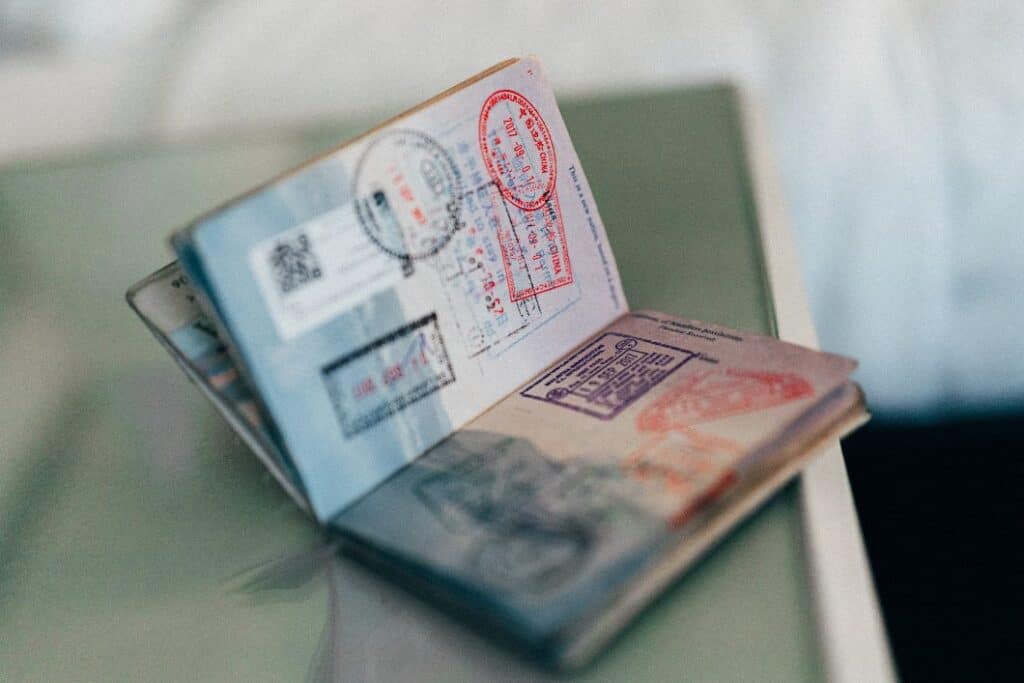
Now, since I studied in Dublin for just one semester we were never REQUIRED to get a student visa, but it was highly recommended of us. If you will be there for just over 3 months, the only time you really have to worry about getting the visa is if you plan to do a lot of traveling outside of the country.
If you stay in the country for 3 months and try to leave and return to Ireland, you will not be allowed re-entry. Some students took the risk of not applying (and paying €60) for a student visa and finished all of their traveling within the first 3 months.
Can You Work While Studying Abroad in Ireland?
If you wish to work while you are studying in Ireland, you will want to check that your course is on the Interim List of Eligible Programmes. You will get a “stamp number 2” endorsed on your passport and will be allowed to work up to 20 hours during the school year and up to 40 hours during vacation time.
For the full, official guide to visas in Ireland, visit Citizens Information.
Living in Dublin as a Student
Dublin is a great place to live as a student. There are five public universities to choose from in Ireland, including Trinity College Dublin which is one of the most prestigious universities in the world and is located straight in the city center.
Between all five of the universities, there are plenty of subjects to choose from. Each university also offers an extensive range of activities and social clubs to join.
Dublin as a whole is very open to young people. There is plenty to explore and always a fun nightlife. Plus it is very easy to get around Dublin, either on foot or by public transportation.
Living in Dublin with Family
Dublin is a fantastic city for just about everyone. Whether you are a student looking for the nightlife, or a family living in Dublin with their kids. Many families prefer to live in the suburbs of Dublin rather than the city center for a bit of a quieter and slower pace of life.
Ranelagh is one of the best areas in Dublin for families. There are excellent schools nearby and a fantastic family-friendly compromise between residential and central city. Rathmines is another great nearby neighborhood, with a chance of more affordable housing options.
There are great kid-friendly activities in Dublin from the Zoo, Lambert Puppet Theater, and Imaginosity Children’s Museum to arcades, jump zones, and bowling alleys.
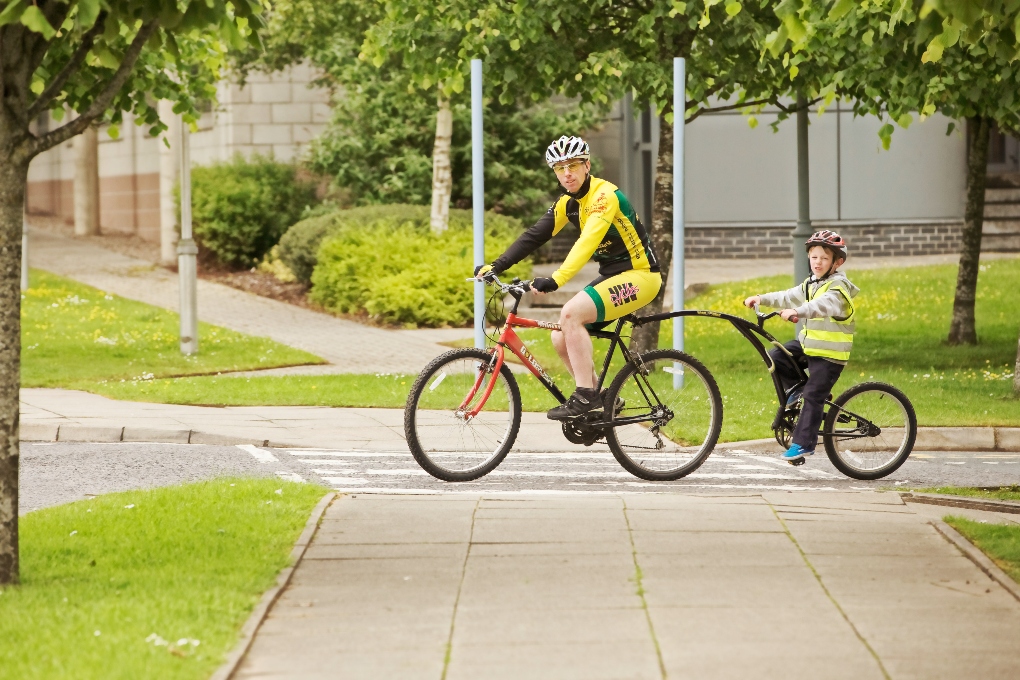
What Is Work Culture Like in Dublin?
Business in Dublin is booming right now, especially in the technology sector. Huge companies such as Google, HubSpot, and Microsoft all have large offices in Dublin.
The work culture in Dublin is comparable to that of most western societies. It is more similar to European cultures and slightly slower-paced than American workplaces. Ireland tends to foster a work hard, play hard style of business.
The Irish are very friendly and generally casual people.

I would see men and women in business attire in pubs at all hours of the day! It seems unusual, but it is not uncommon to meet business connections or conduct meetings over a pint of Guinness.
It is a stereotype that the Irish work on their own time clock, but it has a nugget of truth to it. Irish workers and students still get everything finished and are hard workers. They just tend to not be as aggressively work-oriented, and prioritize enjoying life and spending time with friends and family.
Americans are often put off at first by some of the work habits in Dublin – until they realize the benefits of having a life that is not fully centered around their job!
Where Are the Best Places to Live in Dublin?
There are plenty of great areas and neighborhoods to live around Dublin. If you are looking to stay in the city, I would recommend trying to stay South of the river, or near the river. The areas tend to be safer and you are closer to most of the activity of the city.
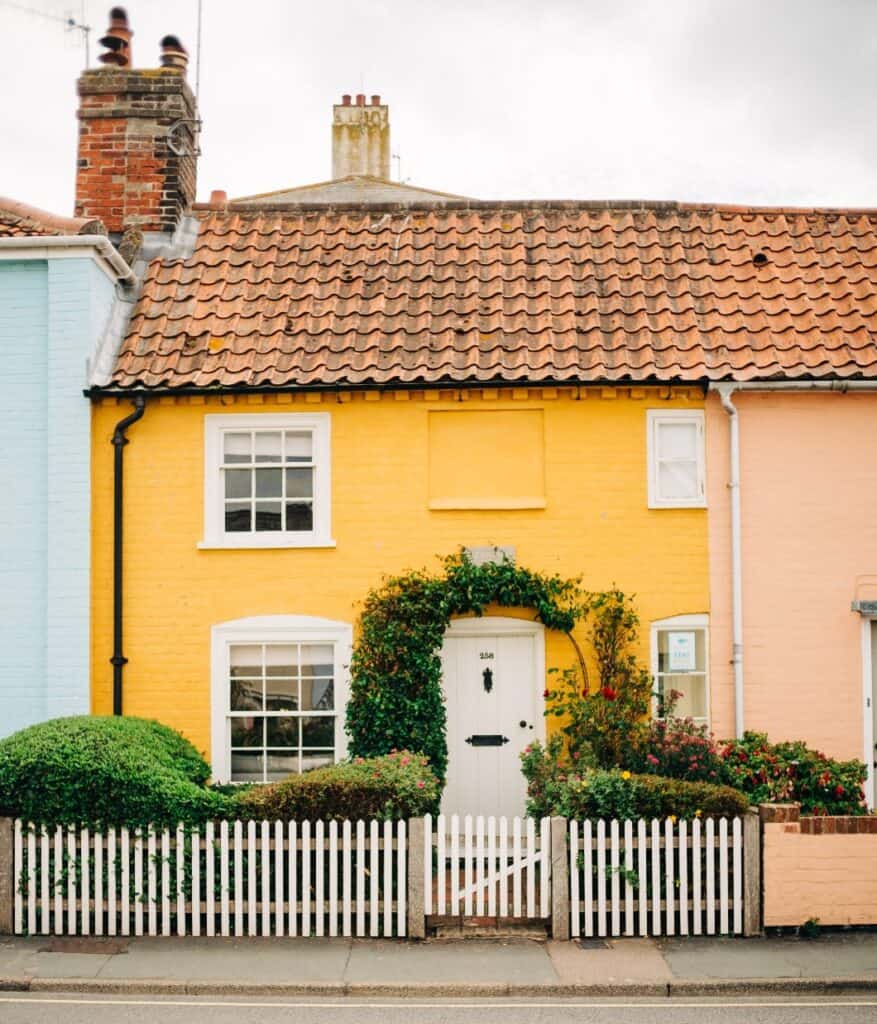
Similar to many cities, there are more apartments closer to the center of Dublin and more houses to the outskirts of the city. If you are looking for quieter areas and don’t mind taking transportation into the city, then you can look a bit further outside of the city center.
The areas around the universities in Dublin (with the exception of Trinity because it is directly in the middle of the city) are typically surrounded by more suburban neighborhoods and family homes, and can be nice areas to live in.
How to Find Accommodation in Dublin:
The best place to start is to search through general rental websites. Popular sites in Dublin include: Rentberry, Rent.ie, or Daft.ie.
Consider a homestay, or living with an Irish local. I had two friends do this and both had a blast! Homestays can be a great way to get a deeper cultural view of Ireland and meet locals quicker.
Search Facebook groups such as Dublin Rent a Room with 55K members or Dublin Student Accommodation with 5K members. People will post if they are looking for someone to live with, or if they have an opening that they need to fill.
When you are considering accommodation in Dublin, you will have a much easier time if you are flexible with your expectations.
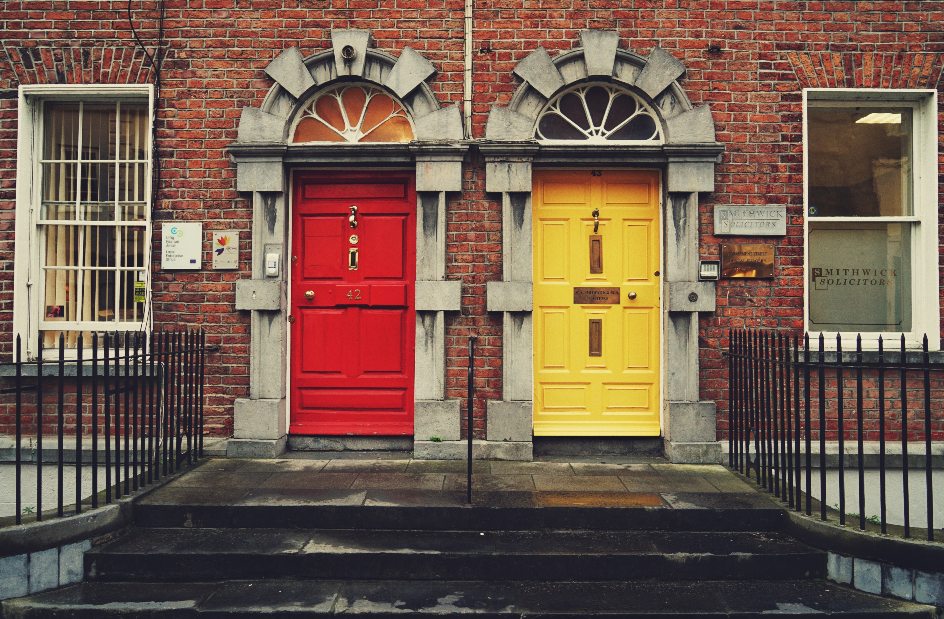
You will also have an easier time finding more affordable housing if you are open to sharing a room, having a smaller space, or having fewer amenities.
There are plenty of options if you can think outside of the box and get creative with where and how you search for your housing. With any of these options please be careful, use your best judgment when working with people you meet online, and be aware that there are many scams surrounding housing.
Read this for a more comprehensive guide to accommodation in Dublin.
Are There a Lot of Other International People Living in Dublin?
Yes! Dublin is surprisingly international. About 20% of the population living in Dublin is international.
It is very common to hear different languages walking down the street. The city center is also pretty touristy, which contributes to the international feeling. The universities in Dublin all have resources and global centers for international students looking to study abroad.
Is It Easy to Make Friends in Dublin?

Due to the friendly nature of Irish people, it felt pretty easy to make friends in Dublin. Most people are always open to chatting over a pint in the pubs if you strike up a conversation!
If you are a student in Dublin, joining social societies and going to events hosted by your university is a great way to easily make friends. You can always check for Facebook groups or use apps such as Meetup to find local groups of people with similar interests.
Try to find other international people to make friends with as well as Irish locals. Expats tend to be open to making new friends easily because they are in a similar situation as you are with trying to get settled in a foreign location.
How Do You Get Around the City of Dublin?
Dublin is an incredibly easy city to explore. One of my favorite parts of living in Dublin was how walkable the city was. I lived out towards the Guinness Factory and it only took me about 20 minutes to walk just about anywhere I wanted to go in and around the city center.
If you are looking to leave the city center, or you just aren’t much of a walker, there is also a great public transportation system as well. The DART (Dublin Area Rapid Transport) is the quickest and easiest way to get around. It runs all the way out and along the coast, from Howth in northern Ireland down to County Wicklow.
There are plenty of bus services running around and out of Dublin at affordable prices. The buses have a wide variety of stops around the city, buses to the airport, and buses to various cities across Ireland as well.

You can buy tickets for Dublin’s public transportation at stations, on buses, or online. However, if you plan to use public transportation frequently, use Dublin’s “Leap Card.”
The Leap Card is valid for 1, 3, or 7 days as needed and can be topped up with travel credit when required. This pass will save you up to 31% on your travel in Dublin and works with the DART, LUAS, Dublin Bus, and Airlink 747/757 services. It is really the most convenient way to get around Dublin if you are planning to stay there long-term.
Taxis are also common around Dublin. Uber and Lyft are heavily controlled in Dublin. So, when you order an Uber, you are actually ordering a taxi. For this reason, taxis can easily be found and flagged down across the city.
>>> RELATED POST: Getting Around Cork
Language and Cultural Differences When Living in Dublin
Ireland is an old country with a unique culture. Most international expats will discover that there are at least a few slight language and cultural differences when living in Dublin.
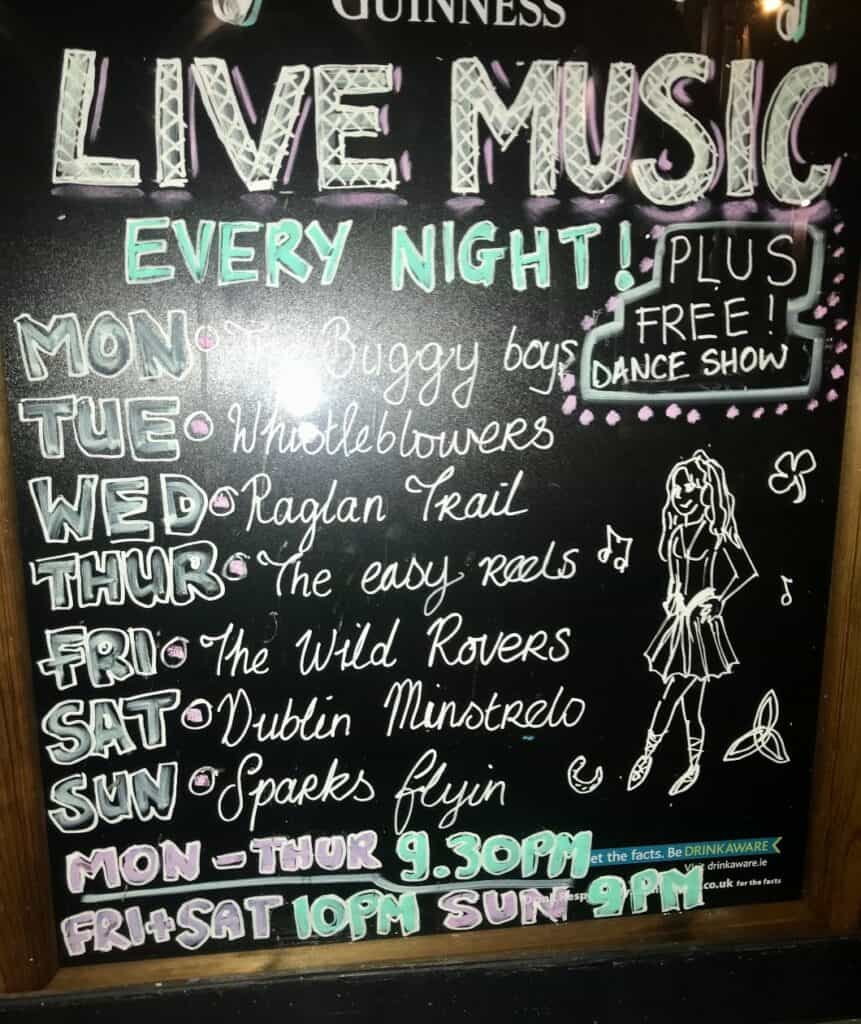
As an American, the most notable difference for me was the slang used. Of course everyone I met there spoke English, but sometimes I could swear they were speaking an entirely different language because there is so much Irish slang!
A few of the best Irish slang words that threw me off at first were “craic”, “shifting”, “bang on”, and “gas”.
Making out or kissing is referred to as “shifting.” Someone might ask you “did you get the shift last night?” if they want to know if you kissed someone.
Want to get the shift?
❤️ 37 Surprisingly Fun and Romantic Things to Do in Dublin for Couples ❤️
“Craic” means “good fun.” So when people say to you “we had some good craic last night” they mean they had fun, NOT that they did a bunch of drugs!
“Bang on” means “right on” or “correct.” And “gas” is something funny or amusing. Someone might say, “that was gas!” Not to be confused with “gaff”, which means house.
Food and Grocery Stores in Dublin
Grocery stores and restaurants are very similar to those in the UK or the US. The most common generic grocery stores in Dublin with the best prices are Tesco, Lidl, or Spar. They will pretty much your standard needs in terms of meats, breads, fruits and vegetables, etc.
You will find far less variety than in the US, as America is known for its “super” markets. There a few different names for food as well. Such as: zucchini is courgette, cilantro is coriander, fries is chips, and half and half is cream (half and half in Ireland means you want half chips and half rice with your curry).
Ireland is not a country known for its amazing cuisine.

“Traditional” Irish cuisine is typically centered around meats and potatoes. You will still have to try out some of their best dishes such as Shepards Pie, and of course a full Irish breakfast!
I’m a bit of a spoiled Californian when it comes to dining, so I found the food culture to be a bit lacking. However, due to the large international influence, you can still find interesting restaurants serving dishes from Chinese to Korean, Mexican to Ethiopian.
Tips for Moving to Dublin
- Get an Irish sim card as soon as you arrive. You can buy them online, but they are also easy to find by just asking drugstore-type locations. I paid about €20/month for a pre-paid card.
- Try to find accommodation BEFORE you get to the city, as it can be really difficult to find somewhere to live in Dublin.
- Be prepared for the weather to change. Always dress in layers and bring a raincoat for safe measure, even if the sky looks clear when you leave!
- Get familiar with the buses and trains. Understanding public transportation off the bat makes it much easier to get familiar with the city as a whole from the beginning.
- Dryer sheets are not a thing in Dublin! Ok this one is a random tip… but when I first got to Dublin I asked where the dryer sheets were and got such a strange look from the worker because Irish people tend to hang dry their clothes.
- Make sure to explore the whole island while you are living in Dublin! Ireland is a beautiful country with many unique cities and towns all across it.
For a comprehensive guide to living as an expat in Ireland… click here.
☘️ ☘️ ☘️
P.S. If you’re heading to the Cliffs of Moher from Dublin (which of course you will need to do once living there!), check out these tours that can save you money by bundling transportation and ticket cost!
Disadvantages of Living in Dublin (CONS)
The biggest disadvantage for me of living in Dublin, beyond being expensive, was the weather being on the colder side for my preference. I actually didn’t hate the weather as much as I thought that I would, but it would definitely be a big factor for me if I was staying for longer than a few months to a year.
Ireland is progressive in many ways, but it can also be very conservative in many ways as well. Ireland is a very Catholic nation, which you can see in some of its rules. This may be good news for some people, but a lot of people struggle with some of Ireland’s more restraining and conservative views.
Looking for resources to use for your next trip or move abroad?
CLICK HERE for my favorite travel and expat tools!
Advantages of Living in Dublin (PROS)
I loved living in Dublin for so many reasons! The people are incredibly friendly and welcoming; it is hard to feel unhappy when everyone around you is always smiling and laughing.
Dublin always felt like it had something going on, whether it was a market, live music playing, a pub crawl, or a theater show being put on. I never got bored with what Dublin had to offer me, and I met some of the most amazing friends that I still keep in touch with today.
➡️ The BEST Dublin Pub Crawls and Drinking Experiences (including top pubs and nightclubs!)

Dublin has a very strong LGBTQ community. Ireland was actually the first country to legalize gay marriage by popular vote, and they are very proud of it! There are LGBTQ bars and clubs around town that create a safe space for everyone to express themselves.
Living in Dublin as an American
Living in Dublin as an American was an incredible experience! Irish people are very friendly and welcoming and there is plenty to explore across the country, as well as taking advantage of budget European flights. Depending on your situation, if you are working remotely abroad the time difference might be a challenge for communication back home. Otherwise, you will appreciate that the country speaks English and the culture shock is relatively small.
Dublin was a truly amazing city to live in! I am sure you will find the city to be just as wonderful as I found it, and will cherish your time living in Dublin. If you have any questions about your move to Ireland, please feel free to ask me at janelle@makethetripmatter.com.
Related Posts:
Top 25 Things to Do in Howth
Scotland vs. Ireland
Student Accommodation in Dublin
☘️FAQs About Ireland☘️
✈️ Where Can You Find the BEST Flight Deals to Ireland?
1. Scott’s Cheap Flights – FREE flight deals alert, works best if you can be flexible
2. Skyscanner – FREE search engine, great for budget flights + deal
❗Is Travel Insurance Required in Ireland?
No, it’s not.
However, it’s always recommended to have travel insurance any time you travel in case of injury, accident, lost luggage, missed flight, etc. The best and most affordable travel/expat insurance is Safety Wing.
>>>CLICK HERE FOR INFO
☔️ When Is the Best Time to Visit Ireland?
Summer (June-August) – is the warmest and rains the least but you will have the most crowds.
Spring (March-May) or Fall (September-November) – are cooler and have more rain but you will beat the crowds and see some incredible wildflowers (spring)/greenery (fall).
🏠 Where Should You Stay in Ireland?
Hotels, hostels, vacation rentals, and house sitting are all available in Ireland for accommodation. My top recommendations for each are:
• Booking.com
• Hostelworld
• Vrbo (usually better options than Airbnb in Ireland)
• Trusted Housesitters (watch a home/pets in return for a FREE place to stay)
☘️ Where Can You Find Tours?
I found incredible tours in Ireland >>>HERE for private and guided group tours of both the most popular attractions and ones that fit your specific interests.
🚘 Should You Rent a Car in Ireland?
I always tell my friends and family to rent a car in Ireland so that they don’t miss out on the gorgeous scenery and wonderful things to do in between the big cities! However, if you plan to stay only in the cities, then you should be fine getting by with buses and walking.
>>> What to know about driving in Ireland
>>> The best car rental in Ireland
🍻 Make sure to try out the pubs! Even if you don’t drink, the atmosphere, live music, and friendly people are very uniquely Irish.

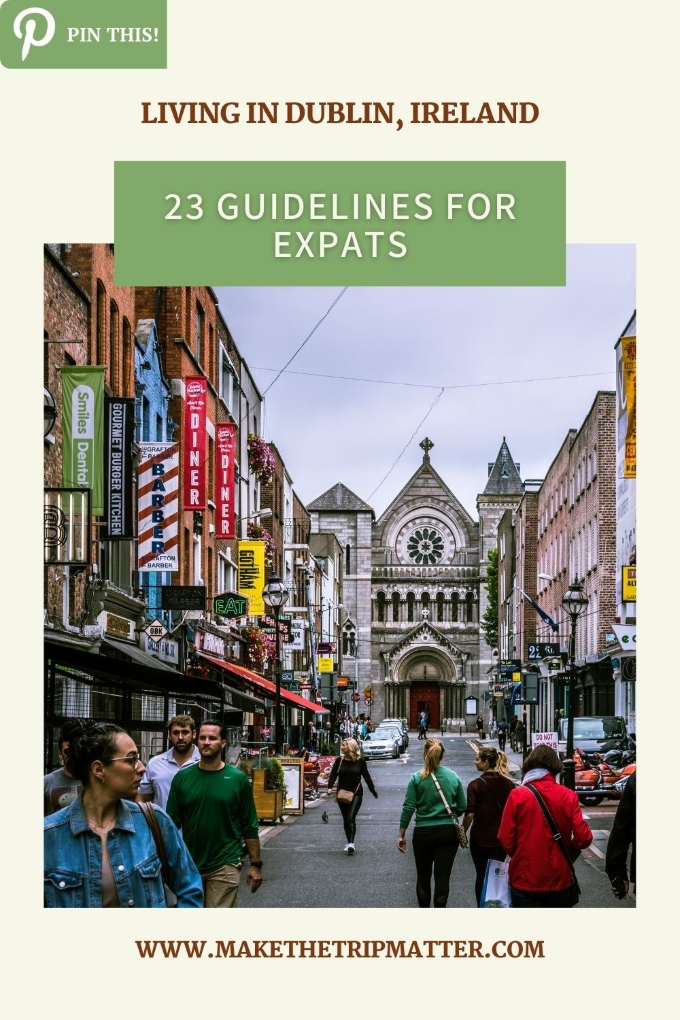







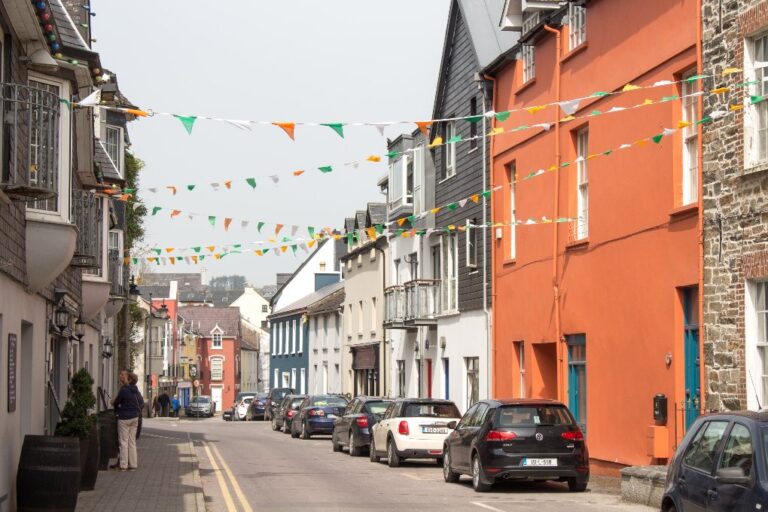

Wow! I did not know how progressive Dublin was and that it has a very strong LGBTQ 🏳️🌈 community. Thank you for sharing!
I was surprised by it too when I moved there, but super cool! If you’re ever in Dublin, The George was our favorite LGBTQ bar that always had interesting events going on.